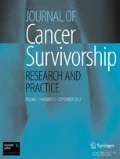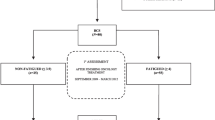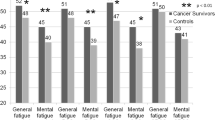Abstract
Introduction
Fatigue is a frequent problem during and after cancer treatment. We investigated different courses of fatigue from pre-diagnosis, through therapy, to long-term survivorship and evaluated potential implications on long-term quality of life (QoL).
Methods
Breast cancer patients diagnosed in 2001–2005 were recruited in a case–control study in Germany (MARIE). At follow-up in 2009 (median 5.8 years, MARIEplus), patients self-reported current fatigue and QoL status using validated questionnaires (FAQ, EORTC QLQ-C30). In addition, survivors retrospectively rated fatigue levels pre-diagnosis, during different treatment phases, and 1 year post-surgery. Our analyses included 1,928 disease-free cancer survivors and comparisons with fatigue and QoL scores from the general population.
Results
Fatigue levels were substantially increased during chemotherapy and radiotherapy. Among patients who received both therapies, 61.4% reported higher, 30.0% same, and 8.6% lower fatigue levels during chemotherapy compared to radiotherapy. Courses of fatigue varied widely between individuals. Survivors with persisting long-term fatigue had significantly and markedly worse scores for all QoL functions and symptoms about 6 years post-diagnosis than other survivors and compared to the general population. Survivors without substantial fatigue post-treatment had QoL scores largely comparable to the general population.
Discussions/conclusion
Chemotherapy appears to have a stronger impact on fatigue than radiotherapy. Breast cancer survivors may experience long-term QoL comparable to the general population, even when suffering from substantial fatigue during treatment. Yet, persistent fatigue post-treatment may lead to extensive long-term loss in QoL concerning physical, social, cognitive, and financial aspects.
Implications for cancer survivors
Fatigue management should be obligatory during and post cancer treatment.


Similar content being viewed by others
References
Husmann B, Kaatsch P, Katalinic A, Bertz J, Kraywinkel K, Wolf U. Krebs in Deutschland 2005/2006. Häufigkeiten und Trends, Berlin: Robert Koch-Institut und die Gesellschaft der epidemiologischen Krebsregister in Deutschland e.V.; 2010.
American Cancer Society. Breast cancer facts & figures 2009–2010. Atlanta: American Cancer Society, Inc.; 2010.
Arndt V, Stegmaier C, Ziegler H, Brenner H. A population-based study of the impact of specific symptoms on quality of life in women with breast cancer 1 year after diagnosis. Cancer. 2006;107:2496–503.
Prue G, Rankin J, Allen J, Gracey J, Cramp F. Cancer-related fatigue: a critical appraisal. Eur J Cancer. 2006;42:846–63.
Curt GA, Breitbart W, Cella D, Groopman JE, Horning SJ, Itri LM, et al. Impact of cancer-related fatigue on the lives of patients: new findings from the Fatigue Coalition. Oncologist. 2000;5:353–60.
Bardwell WA, Ancoli-Israel S. Breast cancer and fatigue. Sleep Med Clin. 2008;3:61–71.
Bower JE, Ganz PA, Desmond KA, Bernaards C, Rowland JH, Meyerowitz BE, et al. Fatigue in long-term breast carcinoma survivors: a longitudinal investigation. Cancer. 2006;106:751–8.
Minton O, Stone P. How common is fatigue in disease-free breast cancer survivors? A systematic review of the literature. Breast Cancer Res Treat. 2008;112:5–13.
Glaus A, Muller S. Measuring fatigue of cancer patients in the German-speaking region: development of the Fatigue Assessment Questionnaire. Pflege. 2001;14:161–70.
Beutel ME, Hinz A, Albani C, Brahler E. Fatigue assessment questionnaire: standardization of a cancer-specific instrument based on the general population. Oncology. 2006;70:351–7.
Fayers PM, Aaronson NK, Bjordal K, Groenvold M, Curran D, Bottomley A, on behalf of the EORTC Quality of Life Group. The EORTC QLQ-C30 scoring manual. 3rd ed. Brussels: European Organisation for Research and Treatment of Cancer; 2001.
Schwarz R, Hinz A. Reference data for the quality of life questionnaire EORTC QLQ-C30 in the general German population. Eur J Cancer. 2001;37:1345–51.
Cocks K, King MT, Velikova G, Martyn St-James M, Fayers PM, Brown JM. Evidence-based guidelines for determination of sample size and interpretation of the European Organisation for the Research and Treatment of Cancer Quality of Life Questionnaire Core 30. J Clin Oncol. 2011;29:89–96.
Donovan KA, Jacobsen PB, Andrykowski MA, Winters EM, Balducci L, Malik U, et al. Course of fatigue in women receiving chemotherapy and/or radiotherapy for early stage breast cancer. J Pain Symptom Manage. 2004;28:373–80.
Alexander S, Minton O, Andrews P, Stone P. A comparison of the characteristics of disease-free breast cancer survivors with or without cancer-related fatigue syndrome. Eur J Cancer. 2009;45:384–92.
Meeske K, Smith AW, Alfano CM, McGregor BA, McTiernan A, Baumgartner KB, et al. Fatigue in breast cancer survivors two to five years post diagnosis: a HEAL Study report. Qual Life Res. 2007;16:947–60.
Bower JE, Ganz PA, Desmond KA, Rowland JH, Meyerowitz BE, Belin TR. Fatigue in breast cancer survivors: occurrence, correlates, and impact on quality of life. J Clin Oncol. 2000;18:743–53.
Reinertsen KV, Cvancarova M, Loge JH, Edvardsen H, Wist E, Fossa SD. Predictors and course of chronic fatigue in long-term breast cancer survivors. J Cancer Surviv. 2010;4:405–14.
So WK, Marsh G, Ling WM, Leung FY, Lo JC, Yeung M, et al. The symptom cluster of fatigue, pain, anxiety, and depression and the effect on the quality of life of women receiving treatment for breast cancer: a multicenter study. Oncol Nurs Forum. 2009;36:E205–14.
Thornton LM, Andersen BL, Blakely WP. The pain, depression, and fatigue symptom cluster in advanced breast cancer: covariation with the hypothalamic–pituitary–adrenal axis and the sympathetic nervous system. Health Psychol. 2010;29:333–7.
Caffo O, Amichetti M, Ferro A, Lucenti A, Valduga F, Galligioni E. Pain and quality of life after surgery for breast cancer. Breast Cancer Res Treat. 2003;80:39–48.
Nesvold IL, Reinertsen KV, Fossa SD, Dahl AA. The relation between arm/shoulder problems and quality of life in breast cancer survivors: a cross-sectional and longitudinal study. J Cancer Surviv. 2011;5:62–72.
Goedendorp MM, Gielissen MF, Verhagen CA, Bleijenberg G. Psychosocial interventions for reducing fatigue during cancer treatment in adults. Cochrane Database Syst Rev 2009;(1):CD006953.
David A, Pelosi A, McDonald E, Stephens D, Ledger D, Rathbone R, et al. Tired, weak, or in need of rest: fatigue among general practice attenders. BMJ. 1990;301:1199–202.
Acknowledgements
Funding: The MARIE/MARIEplus study is funded by the Deutsche Krebshilfe e.V. [grant no. 70-2892-BR I and 108253/108419], the Hamburg Cancer Society, the German Cancer Research Center, and the German Federal Ministry for Education and Research [grant no. 01KH0402]. We thank U. Eilber, C. Krieg, S. Behrens, R. Birr, and T. Olchers for data collection and management.
Author information
Authors and Affiliations
Corresponding author
Rights and permissions
About this article
Cite this article
Schmidt, M.E., Chang-Claude, J., Vrieling, A. et al. Fatigue and quality of life in breast cancer survivors: temporal courses and long-term pattern. J Cancer Surviv 6, 11–19 (2012). https://doi.org/10.1007/s11764-011-0197-3
Received:
Accepted:
Published:
Issue Date:
DOI: https://doi.org/10.1007/s11764-011-0197-3




